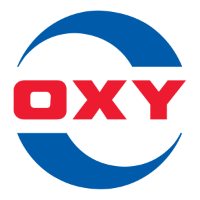
FMP

Occidental Petroleum Corporation
OXY
NYSE
Occidental Petroleum Corporation, together with its subsidiaries, engages in the acquisition, exploration, and development of oil and gas properties in the United States, the Middle East, Africa, and Latin America. It operates through three segments: Oil and Gas, Chemical, and Midstream and Marketing. The company's Oil and Gas segment explores for, develops, and produces oil and condensate, natural gas liquids (NGLs), and natural gas. Its Chemical segment manufactures and markets basic chemicals, including chlorine, caustic soda, chlorinated organics, potassium chemicals, ethylene dichloride, chlorinated isocyanurates, sodium silicates, and calcium chloride; vinyls comprising vinyl chloride monomer, polyvinyl chloride, and ethylene. The Midstream and Marketing segment gathers, processes, transports, stores, purchases, and markets oil, condensate, NGLs, natural gas, carbon dioxide, and power. This segment also trades around its assets consisting of transportation and storage capacity; and invests in entities. Occidental Petroleum Corporation was founded in 1920 and is headquartered in Houston, Texas.
52.1 USD
0.28 (0.537%)

EBIT (Operating profit)(Operating income)(Operating earning) = GROSS MARGIN (REVENUE - COGS) - OPERATING EXPENSES (R&D, RENT) EBIT = (1*) (2*) -> operating process (leverage -> interest -> EBT -> tax -> net Income) EBITDA = GROSS MARGIN (REVENUE - COGS) - OPERATING EXPENSES (R&D, RENT) + Depreciation + amortization EBITA = (1*) (2*) (3*) (4*) company's CURRENT operating profitability (i.e., how much profit it makes with its present assets and its operations on the products it produces and sells, as well as providing a proxy for cash flow) -> performance of a company (1*) discounting the effects of interest payments from different forms of financing (by ignoring interest payments), (2*) political jurisdictions (by ignoring tax), collections of assets (by ignoring depreciation of assets), and different takeover histories (by ignoring amortization often stemming from goodwill) (3*) collections of assets (by ignoring depreciation of assets) (4*) different takeover histories (by ignoring amortization often stemming from goodwill)